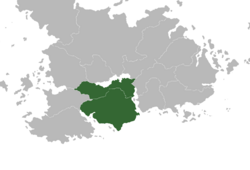Pukhtunistan
This article is a geographic placeholder stub intended to be integrated by new players. It describes the general situation of this territory and its relation to other countries. It should not be understood to be a freestanding country.
|
Calto | |
|---|---|
Region of Sarpedon | |
 Location of Calto (green) in Sarpedon (gray) | |
| Continent | Sarpedon |
| Historical Relations | |
| Possible cultures | Slavic Finno-Ugric |
| Area | |
| • Total | 259,000 km2 (99,999 sq mi) |
Calto is a region in south-central Sarpedon. It borders Volonia to the west, Caphiria to the north, Bertina to the south, and Russotto to the east.
Calto sits in Sarpedon's southern region, and its area was primarily settled by Slavic peoples, with some legacy influence of the Ancient Istroyan civilization. Much of Calto's pre-history and early history is largely defined by the presence of nomadic tribes who were ancestors of the Slavic people, similar to the rest of south-central Sarpedon. The critical change in this region came in the medieval period, as the region was subject to significant Caphiric influence, particularly during the Slavic-oriented Third Imperium part of Caphiria's history from 1283 through 1782. Due to longstanding Caphiric influence, as well as general trends throughout the continent, the people of Calto were likely historically Catholic.
The Sultanate of Pukhtunkhwa(Pashto: د پښتونخوا سلطنت Urdu: سلطنت پختونخوا Dari: سلطان نشین پختونخوا) is located at the north of Islamic republic of Umardwal and Battganur. The nearest state north of Pukhtunkhwa is the nation of Republic of Bulkh and while Confedrated States of Peshabiwar and Tapakdore lie in the east. It has a population of 85,875,314 per 2020 census and a strong economy of $2.768 trillion GDP(nominal). Pukhtunkhwa additionally manages partial control over territories that form a part of Pukhtunkhwa Overseas Territories(POST).